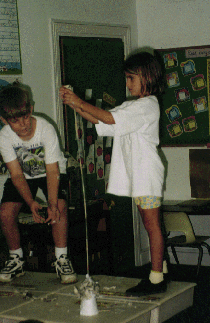| Sharing Science | |||||||||||
| Kids Teaching Kids | |||||||||||
| Be An Einstein...Ask Why? | |||||||||||
| On-Line Physics | |||||||||||
| Enrichments | |||||||||||
| Collaboratives | |||||||||||
If you would like any information on these or other collaborative programs please use the following e-mail address: send mail to kskrutvold@uswest.net.




"QUEST"
Quality Educational Skill Teams
An important educational goal for educators should be to nourish creativity and problem solving in our students. Each team of individuals should be provided with an opportunity to reach his or her potential. Unfortunately this is not always the case. Some advances have been made in recent years throughout the educational arena to help meet the needs of the creative individual, but this is only a beginning; more has to be done!
So, Mary and I have taken yet another initiative in trying to develop a program called "Quest" to enhance the creative, intuitive process of problem solving in an age appropriate teams concept. The primary conceptual idea comes from our personal desire to make a difference in the creative problem solving development of the youth at the International School of Prague. Many times, we can become too comfortable about doing good things in our classrooms, but we must look at the critical needs of our students and move forward. Our program being similar to that of academic competitions actually can be likened to the well known "Odyssey of the Mind" programs in the United States.
In taking a close look into academic programs at specific elementary levels we find numerous materials and activities for the upper elementary grades, but fall far short in the intermediate elementary grades, more specifically in the 3rd and 4th grade levels. It is our primary intention then to proceed in ways to equally enhance the math, computer, and science programs at these intermediate levels through this creative means of delivery and activities we call "Quest".
Overwhelmingly, we feel that the process of developing creative problem solving skills is through the active participation in team work and competitions, along with the integration of concept specific materials. It is our hope that those students who wish to participate are allowed to participate and that this does not become known as a gifted or elitist program. There is one more main factor which may not seem important, but we certainly think it is. That is to have fun! When we enjoy doing something, we work hard at it. Why do people play golf? They carry eighteen pounds for five miles, are frustrated half the time, and pay a great deal of money to do it. They play because of the key word "play." They like doing it. The same "why" may be asked of those who ski, hunt, climb mountains, fish, etc...We do these things because it is fun and challenging. We have all been students and, when we have an opportunity to elect an activity or course, we try to take something that we may enjoy. These are the types of activities and parts of the program that we are encouraging in the creative endeavor of "Quest."
We feel that an activity-centered program, "Quest", can best serve the needs of the International student body. The intention of our program is to offer and stress that:
- Learning begins and proceeds through work with concrete materials.
- Scope of study is narrower but deeper than in book programs.
- Learning activities are more open-minded than in book programs.
- Pupils use a variety of process skills as they work in cooperative teams.
- Each activity is supported by recognized learning theory.
- Basic science principles are stressed in creative problem-solving.
- Mathematics is integrated into the learning activities.
- Topics and activities will have personal and social applications.
- Activities will challenge pupils' misconceptions and allow rethinking of their ideas.
- And most importantly develop fun and exciting learning experiences for our pupils.
Our proposal is to meet bimonthly with one hour sessions to start. The proposed class limit is for 16 students. We feel this will allow for maximum efficiency of available building space, as well as, effectiveness to spend individual time with the teams.
Innovations in education are risky business. Yet the benefits far outweigh the pitfalls of other types of learning and teaching styles. This type of program challenges all and makes them eager to take on a creative endeavor to accept and understand the real world. Good results from this type of science, mathematics, and computer curriculum project can influence nearly everyone in education. We feel this will noticeably upgrade the quality of what we teach and do in our individual classrooms. How far can this go? In the long run, it is likely that the only limits to this type of innovation will be what teachers can reasonably be expected to do. But, as in an enterprise of change, the potential is unlimited and the risk is worth it!!